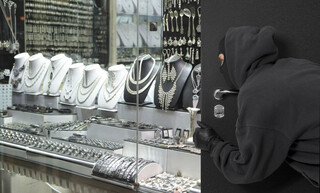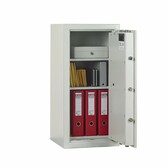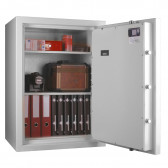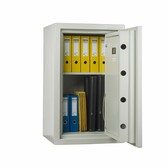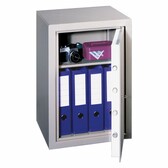The risk of robbery increases in those businesses where cash or expensive and easily transportable goods are traded. This applies not only to jewellery shops, exchange offices, department stores, petrol stations or banks. Theft can even occur on the shop floor if products made of valuable materials are manufactured there. However, depending on your business profile, you can choose the right security features that will effectively protect you against burglary and property damage.
Robberies are rare but dangerous
Taking into account police statistics, the share of robbery crimes in all criminal acts is relatively small. However, robberies have one thing in common – the perpetrators are aggressive and threatening and even violent in order to steal the loot. There are also times when things get out of hand and criminals turn to weapons. The greater the risk of such an attack occurring, the greater the demands on security. Both employees and valuables must be protected.
What is conducive to robbery?
Before you select a set of individual security measures, you should analyse the situation and consider to what extent your business activities "encourage" criminals to rob your property. In the experience of the police and the German Association of Property Damage Insurers, one of the most prestigious security testing institutes in Europe, there are at least several factors. These include: easily accessible premises, potentially valuable loot, the possibility of a quick robbery and escape and a small number of people in the place of the planned robbery.
How does a robbery occur?
In practice, robbery occurs in several ways. A typical method for thieves is to attack an employee when the premises are open. Less frequently, it occurs when an employee enters or leaves the premises. Inside and outside the establishment robberies may also occur when transporting money or valuables. To minimise the risk of individual crimes, it is worth making organisational changes in the company.
Basic organisational changes to prevent robbery
Firstly, the availability of cash and valuables should be restricted. This is because these are the most attractive incentives for criminals to rob. The amount of overtly stored goods should be reduced to a minimum and presented, e.g. in lockable display cabinets or separate rooms. Cash in hand should be regularly drained. Information about monitoring and the fact that valuables are kept under lock and key in a time-delayed manner can also be displayed prominently. Where large amounts of cash are involved, it is advisable to introduce a deposit system. A good solution would be to equip the company with office safes.
Other precautions
It is also a good idea to train staff not only on the necessary precautions, but also on how to behave in the event of a robbery. Employees should pay particular attention to keys to rooms, display cases and safes and not leave them in plain sight or in locks. Particularly valuable items should always be locked in safes or safe rooms on a four-eye basis. However, in order to meet all requirements, the company must be equipped with a suitably sized safe container. We will deal with this topic in the next part of this article.
Drop safes at Hartmann Tresore
Safes with armoured glass at Hartmann Tresore
Source: Recommendations and security guidelines of the German Association of Property Damage Insurers (VdS Schadenverhütung GmbH).
Please also read: Securing documents at home and in the company
